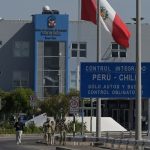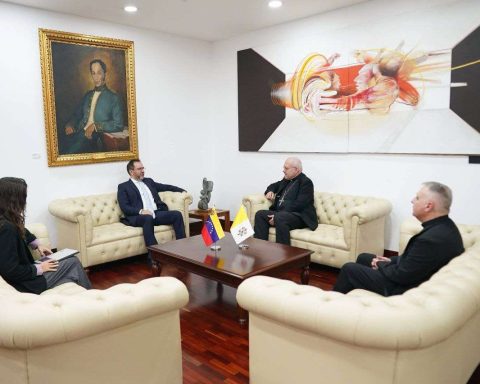“We are going to give ourselves some time to put the treaty into force.” With these words, and from the National Congress in Valparaíso, the Minister of the Interior and Public Security, Carolina Tohá, opened up about the Government’s strategy regarding Chile’s possible accession to the Comprehensive and Progressive Treaty of Trans-Pacific Partnership (known as TPP11 or CPTPP). . This is an issue that in recent weeks has shaken –once again– the internal coexistence between both official coalitions: while Democratic Socialism has pushed for its rapid processing and approval in the Senate, I Approve Dignity has insisted on demanding that President Gabriel Boric to use your powers and remove the project as designed.
But, although at first everything pointed to a new political victory for Democratic Socialism –fully empowered after the arrival of Carolina Tohá (PPD) and Ana Lya Uriarte (PD) to key positions in La Moneda–, I Approve Dignity moved its pieces and tipped the balance in his favor, generating outrage among different factions of the ruling party and opposition, who demand that the President fulfill his commitment to sign the TPP11 and the Pact of the European Union, both announcements agreed upon by the current Head of State in his accession in charge.
The key figure in the negotiation was the senator and helmsman of the Democratic Revolution (DR), Juan Ignacio Latorre, the same person who through the media requested the postponement of the vote in the Upper House, scheduled for this Wednesday. But behind that request a more ambitious strategy was woven: get the sponsorship of the President to prolong the talks on dispute resolution mechanisms, headed by the Undersecretary for International Economic Relations, José Miguel Ahumada. A plan that turned out exactly as planned. I approve of Dignity, since the TPP11 will only be ratified after these negotiations are concluded, so the agreement will be ready in a maximum period of two months.
Therefore, beyond its eventual approval in the Senate, the process will be delayed until the bilateral letters are answered (side letters), with which the Executive seeks to generate dispute resolution mechanisms at said level, that is, bilaterally. In this regard, the Minister of the General Secretariat of Government (Segegob), Camila Vallejo, confirmed that “there has been a strategy considered by the Foreign Ministry, which represents the Government as a whole, to reach these bilateral letters.”
But the argument around the bilateral letters is resisted by some sectors of Democratic Socialism, which express their discontent with the strategy designed by Approve Dignidad and backed by the Government. One of those critical voices is that of the senator and member of the Foreign Relations Committee of the Upper House, José Miguel Insulza (PS), who maintains that the issue related to the side letters it is something rather secondary and has been conveniently used, because –in his opinion– “it is the last issue left to discuss”.
In this sense, the parliamentarian for the Region of Arica and Parinacota says that “if someone wants to solve the form of dispute resolution, it is better done multilaterally with related countries, which jointly undertake an activity for that. The side letters they are agreements between two countries regarding the modality of application of some provision of the treaty between them”.
Regarding the hypothetical postponement of the subscription to TPP11, Insulza adds that “we have been giving the bad international signals for a long time, because we have been postponing it for almost five years. This was approved unanimously in the Foreign Relations Committee of the Senate when I chaired it, three years”. In addition, the socialist senator says that this issue is beyond the simple internal coexistence of government coalitions, “rather it is a problem of the country’s economic situation. Therefore, I think it would be the worst signal we could give to the investors, that we are withdrawing from these types of treaties”.
From his own party, Senator Juan Luis Castro assures that “things are not black and white, and there are different positions within the ruling party.” In this regard, the parliamentarian points out that “more than a specific situation, what we demand is that the Government have a unequivocal position and that this be expressed in an approach when the debate begins this Wednesday, which someone will have to support of the Executive, and all this also has to do with gaining time for the negotiations of the bilateral letters, and that is in development”.
The right and its vision on the strategic overturn of the ruling party
As detailed by the spokesperson Minister Camila Vallejo, the Government communicated this strategy during the day on Tuesday to the different parliamentary benches, through the head of the General Secretariat of the Presidency (Segpres), Ana Lya Uriarte. And it is that, according to the design planned in La Moneda, President Gabriel Boric will play a role in the dialogue with the leaders of the countries that are currently holding talks with Chile for bilateral letters.
“Before making the deposit (presidential ratification of the treaty), we are interested in having these talks and bilateral agreements resolved before the process, which is optional and exclusive to the President of the Republic,” Vallejo pointed out, setting the tone for a discussion that is far to be resolved and that, probably, will continue to generate repercussions, both in Democratic Socialism and in the opposition, a sector that claims to feel surprised by this decision.
Precisely, from Chile Vamos, the senator, member of the Foreign Relations Commission and helmsman of the National Renewal (RN), Francisco Chahuán, summoned the Government in terms of “putting an end to the uncertainties and fulfilling the pledged word. President Boric promised with the heads of state, presidents, foreign ministers and prime ministers who attended his rise to power, that in October we were going to have the TPP11 completely dispatched, and in November the agreement with the European Union. We have seen some official coalitions that do not they have given signs of these certainties, and in times when investment has flattened, it is more important than ever to give signs in terms of being able to approve the TPP11 and also the agreement with the European Union”.
For his part, Juan Antonio Coloma (UDI), who is also a senator and president of the Upper House Finance Commission, was confused, because “the TPP11 was a proposal that was introduced in Congress by former President Bachelet, that was defended by Foreign Minister Heraldo Muñoz, and that a few days ago Minister Marcel told us how important it could be for Chile’s economy to approve this treaty, which has been approved in almost all countries. more linked to the left that wants to boycott the process. The truth is that I do not understand the background of this discussion, because I believe that things must be discussed in the long term and not according to the political contingency of day to day.”
But the truth is that, beyond the criticism of the opposition, I Approve Dignity celebrates what for them is a triumph: getting President Boric to postpone the ratification of the treaty until the formalities for the bilateral letters are completed. Although an important sector of the ruling party believes that this strategy only slows down the process but without affecting Chile’s eventual accession to the TPP11, it is clear that the ideological and programmatic rift between the two coalitions that support the Government’s political project continues to widen. Now, it was an international treaty in charge of stripping those differences, for some, impassable.


















